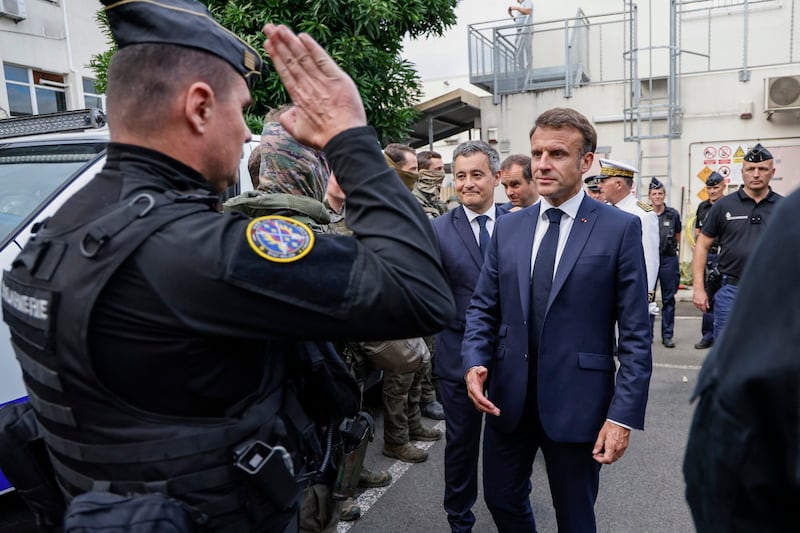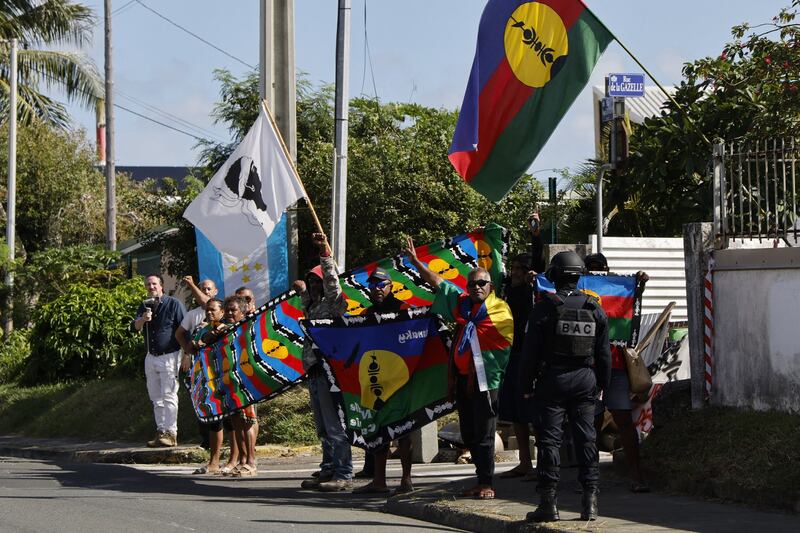French military forces sent to quell New Caledonia’s pro-independence riots will stay “as long as necessary,” President Emmanuel Macron said during a flying visit to the Pacific island territory that reinforced regional perceptions of France as an out-of-touch colonial power.
Six people died, dozens were injured and businesses torched in a week of riots in the capital Noumea triggered by the French government’s move to dilute the voting power of New Caledonia’s indigenous Kanak people. Roads remain blocked by makeshift barricades and Fiji, Vanuatu, Australia and New Zealand are attempting to evacuate their citizens from the island.
The electoral changes, described by Macron as a reform, “will not be forced through in the current context,” he announced before flying out of Noumea following a day of meetings on Thursday. “We will allow some weeks to allow a calming of tensions and resumption of dialogue to find a broad accord."
A security contingent of several thousand that includes elite military troops will remain as long as needed, “even during the Olympic and Paralympic Games" which Paris will host in July and August, he said.
Leaders of pro-independence parties were part of a meeting with Macron but have not yet released a statement. Macron urged them to call on protestors to dismantle barricades.
"Within a month at the latest, I will take stock, assess the situation and decide on the institutional follow-up,” he said. “I will, of course, take into account a return to calm, but also the sincere commitment of the parties to resume negotiations with a view to reaching an agreement.”
Loyalist groups held separate meetings with Macron, highlighting their internal disagreements with how to proceed.

France’s control of New Caledonia and its surrounding islands gives the European nation a significant security and diplomatic role in the Pacific at a time when the U.S., Australia and other Western countries are pushing back against China’s inroads in the region. New Caledonia also has valuable nickel deposits that are among the world’s largest.
The unrest is the worst political violence in the Pacific territory located between Australia and Fiji since the 1980s. The riots erupted May 12 as the lower house of France’s parliament debated and subsequently approved a constitutional amendment to unfreeze New Caledonia’s electoral roll, which would give the vote to thousands of French immigrants.
Final approval of the amendment requires a joint sitting of France’s lower house and Senate.
Since last year, the Front de Liberation Nationale Kanak et Socialiste independence movement had called for the constitutional amendment to be withdrawn and for dialogue on New Caledonia’s status to be resumed.
“We decided to instigate demonstrations in November when we saw that discussions with the French state were stalling. But still President Macron remained deaf to all our calls,” said Roch Wamytan, a pro-independence politician and president of New Caledonia’s Congress.
“There were warning signs,” he said, that unrest could erupt. “Now for more than a week we have been a bit overwhelmed by the events,” he said in an interview with Australian broadcaster ABC.
“I admit that independence leaders were surprised. Perhaps we did not sufficiently take into account the profound frustrations of young Kanak people.
“The main prison here, 95% of the inmates, of which there are about 600, are young Kanak people. We knew that our youth, or part of our youth, had radicalized but we hadn’t understood the depth of this desire for revenge.”

Sonia Backès, a loyalist who is president of New Caledonia’s South Province, said Macron had pledged the law would be enforced.
The president "above all heard the Caledonians, the leaders of business, the mayors who spoke. They told him of the terror that reigns in New Caledonia, of the violence of what happened, of the racism of which we were victims,” she said, the French national broadcaster reported.
Kanaks are about 40% of New Caledonia’s 270,000 people but are marginalized in their own land – they have lower incomes and poorer health than Europeans who make up a third of the population and occupy most positions of power in the territory.
Churches in the devoutly Christian Pacific region, civil society groups, the regional organization representing Melanesian nations and political leaders have condemned France’s attempt to bulldoze through the voting roll enlargement.
The inter-governmental Pacific Islands Forum, of which New Caledonia and not France is a full member, has offered to help mediate the crisis.
“There is a widely-shared perception across the Pacific that the current unrest in New Caledonia is a situation largely of France’s own making,” said Mihai Sora, a Pacific analyst at Australia’s Lowy Institute think tank.
“Pushing through changes to electoral rules that are clearly designed to shift the balance of views locally on the question of independence has served to reinforce regional perceptions of France as an out-of-touch colonial master and exposed contradictions in France’s relationship with the Pacific,” he told RFA-affiliate BenarNews.
New Caledonia is one of six non-self-governing territories in the Pacific inscribed on the U.N.’s decolonization list, making up a third of all the aspiring nations, and the issue remains a hot topic in the region with Bougainville seeking to secede from Papua New Guinea and the long-running independence conflict in Indonesia’s Papuan provinces.
Foreign minister of Vanuatu Matai Seremaiah said the events in New Caledonia were “a stark reminder of the unfinished business of decolonization across the Blue Pacific Continent.”
French Polynesia was relisted by the U.N. General Assembly in 2013, and last year elected the pro-independence government of president Moetai Brotherson, but France has demanded the territory be removed again.
The issue of self-determination for New Caledonia will be squarely on the agenda for Pacific island leaders when the 18-nation Pacific Islands Forum meets in Tonga later this year, Sora said.
New Caledonia voted by modest majorities to remain part of France in referendums held in 2018 and 2020 under a U.N.-mandated decolonization process. Three votes were part of the Noumea Accord to increase Kanaks’ political power following deadly violence in the 1980s.
A contentious final referendum in 2021 was overwhelmingly in favor of continuing with the status quo. However supporters of independence have rejected its legitimacy due to very low turnout – it was boycotted by the independence movement – and because it was unilaterally brought forward by the Macron government during a serious phase of the COVID-19 pandemic, which restricted campaigning.
BenarNews is an RFA-affiliated online news organization.
